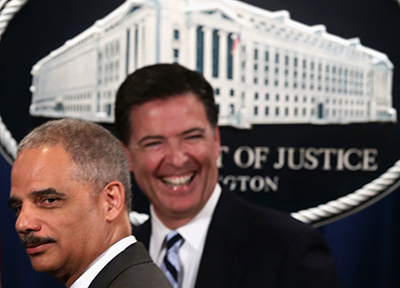Geoffrey King/CPJ Internet Advocacy Coordinator
San Francisco-based CPJ Technology Program Coordinator Geoffrey King works to protect the digital rights of journalists worldwide. A constitutional lawyer by training, King also teaches courses on digital privacy law, as well as the intersection of media and social change, both at UC Berkeley. Follow him on Twitter at @CPJTechnology. His public key fingerprint is 4749 357C E686 71B1 4C60 F149 9338 5A57 27FA 494C.
‘Spear phishing’ attacks underscore necessity of digital vigilance
The revelation that the FBI sent a fake Associated Press story containing malware to a teenager suspected of making bomb threats has brought “spear phishing” back into the public consciousness. The technique, which combines malicious software with social cues tailored to the target, has been used by state and non-state actors to attack journalists and…

For journalists coming into US, policies border on the absurd
I was only supposed to be in Miami for the briefest of layovers. I was en route to San Francisco from São Paulo in Brazil, where I had participated in the NETMundial Conference on Internet governance along with hundreds of members of civil society, technology executives, journalists, and government officials. It was going to be…

How resistance to encryption jeopardizes journalism
Earlier today, the Brookings Institution hosted a discussion with FBI Director James B. Comey, who made the case that steps taken by Apple and Google to protect user privacy were damaging the FBI’s efforts to fight crime and safeguard U.S. national security. The discussion was due to take place hours before Apple launched its latest…
Holder resignation presents U.S. with opportunity for reform
Last week’s announcement by Eric Holder that he will resign as Attorney General marks what will hopefully be the beginning of the end of a perplexingly dark period for press freedom in the U.S. As Holder seeks to solidify his legacy, in part based on important civil rights reforms that he helped realize, the aggression…
TSA policy change could compound security concerns for journalists in transit
On Sunday, the U.S. Transportation Security Administration announced a new policy requiring that travelers to the United States turn on their devices at the request of airport security personnel. Devices that cannot be powered on will be barred from the aircraft, and passengers in possession of such devices may also be subjected to additional screening.…
EU ‘right to be forgotten’ ruling will corrupt history
Google has taken its first public steps to comply with a troubling ruling by the European Court of Justice establishing a so-called “right to be forgotten” throughout the European Union. The ruling, on May 13, requires that search companies consider individuals’ demands to remove Internet links that reference them, and to give those requests priority…
Tom Lowenthal joins CPJ as first staff technologist
Journalism is increasingly mediated by the same digital tools to which we entrust the rest of our lives. In keeping with CPJ’s mission to enable and protect journalists wherever they find themselves under threat, we are pleased to announce the hire of Tom Lowenthal, our first staff technologist.

When the rule of law isn’t: Turkey at the crossroads
In less than a week, Turkish voters will cast their ballots in local elections widely seen as a test of support for embattled Prime Minister Recep Tayyip Erdoğan, who has faced growing questions about official corruption since a high-level probe first became public in December. Although many observers believe Erdoğan will survive the current political…
Media surveillance and ‘the day we fight back’
Today, a broad coalition of technology companies, human rights organizations, political groups, and others will take to the Web and to the streets to protest mass surveillance. The mobilization, known as “The Day We Fight Back,” honors activist and technologist Aaron Swartz, who passed away just over a year ago. Throughout the day, the campaign…

Turkish Internet bill would deepen press freedom crisis
The Turkish parliament is on the verge of voting on radical censorship measures that, if approved, would allow the government to block individual URLs without prior judicial review, mandate Internet data retention for periods of up to two years, and consolidate Internet Service Providers (ISPs) into a single association, among other changes. If passed, the…